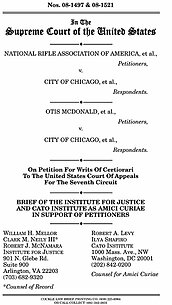Learn more about Cato’s Amicus Briefs Program.
Last summer, in District of Columbia v. Heller, the Supreme Court confirmed what the Framers, most scholars, and a substantial majority of Americans believe: that the Second Amendment protects an individual right to keep and bear arms. Heller led to lawsuits raising the question of whether the Fourteenth Amendment protects that right against infringement by state and local governments. In a consolidated case involving a challenge to Chicago’s handgun ban, the Seventh Circuit answered that question in the negative, finding itself foreclosed by 19th-century Supreme Court decisions. Cato, joining with the Institute for Justice, filed an amicus brief supporting requests for the Supreme Court to review that line of precedent. We argue that the Court’s initial encounters with the Fourteenth Amendment yielded a profound misreading of its Privileges or Immunities Clause that has haunted the Court’s rights jurisprudence ever since. The Chicago petitions present the Court with an unprecedented opportunity to reach back to the very source of that misreading, the 1873 Slaughter-House Cases, and there are three compelling reasons why the Court should do so: 1) the only disagreement among circuit courts in the wake of Heller is whether they are bound by the Court’s decisions refusing to apply the right to keep and bear arms against the states; 2) case law and scholarly commentary together form a kind of constitutional conversation, which has arrived at a clear consensus about Slaughter-House that merits the Court’s consideration; and 3) the Constitution is not merely a blueprint for government, but a charter of liberty. Accurately placing the Fourteenth Amendment within that tradition would be a virtue in itself and would sharpen the national dialogue regarding the source, nature, and limits of our rights.

This work is licensed under a Creative Commons Attribution-NonCommercial-ShareAlike 4.0 International License.



